Analyzing Resource Depletion: Ethical Issues in Childhood Education
VerifiedAdded on 2023/06/10
|11
|3302
|300
Report
AI Summary
This report delves into the ethical issues encountered by professional educators in childhood education, particularly focusing on the impact of resource scarcity on children aged 0-5. It examines how a lack of essential learning materials, such as textbooks and digital resources, hinders the educational process and affects both student learning and teacher effectiveness. The report discusses the stress experienced by educators due to insufficient resources, leading to potential burnout and compromised teaching quality. It further explores related issues like educator appraisal, the importance of UN conventions on child rights, and the ECA Code of Ethics. The Early Years Learning Framework (EYLF) and National Quality Standards (NQS) are also highlighted as frameworks aimed at ensuring quality education and care. Ultimately, the report emphasizes the need for ethical decision-making and improved resource allocation to support effective early childhood learning environments.
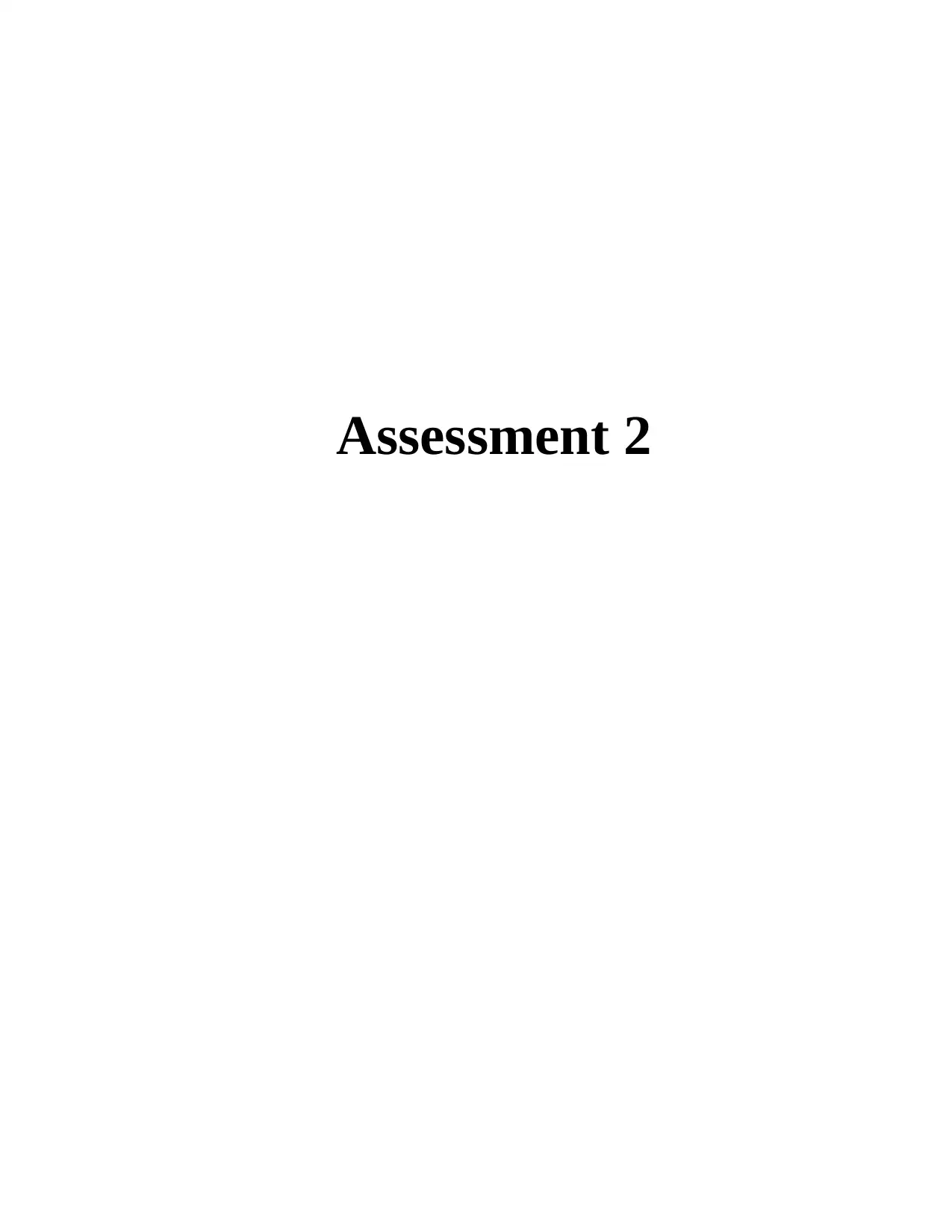
Assessment 2
Paraphrase This Document
Need a fresh take? Get an instant paraphrase of this document with our AI Paraphraser
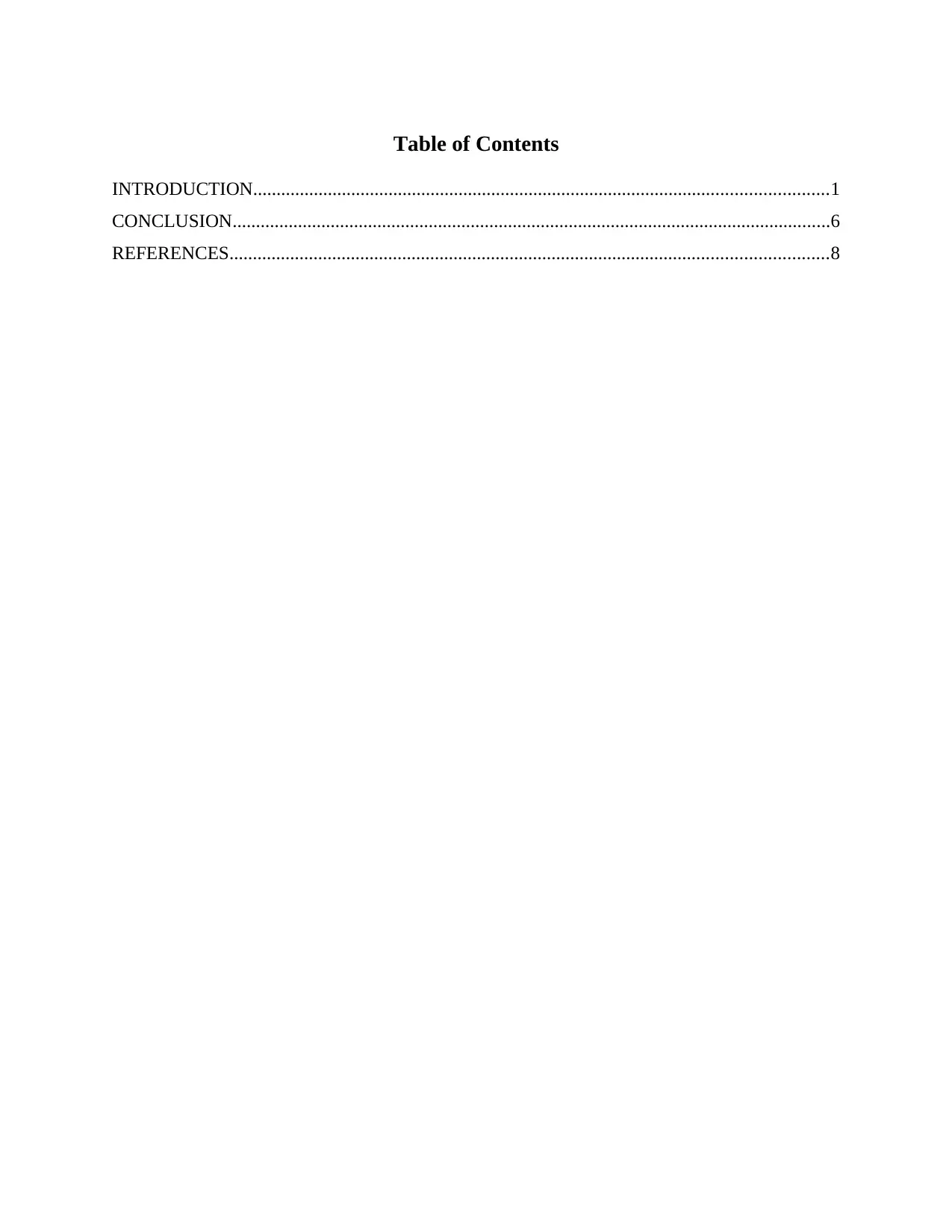
Table of Contents
INTRODUCTION...........................................................................................................................1
CONCLUSION................................................................................................................................6
REFERENCES................................................................................................................................8
INTRODUCTION...........................................................................................................................1
CONCLUSION................................................................................................................................6
REFERENCES................................................................................................................................8
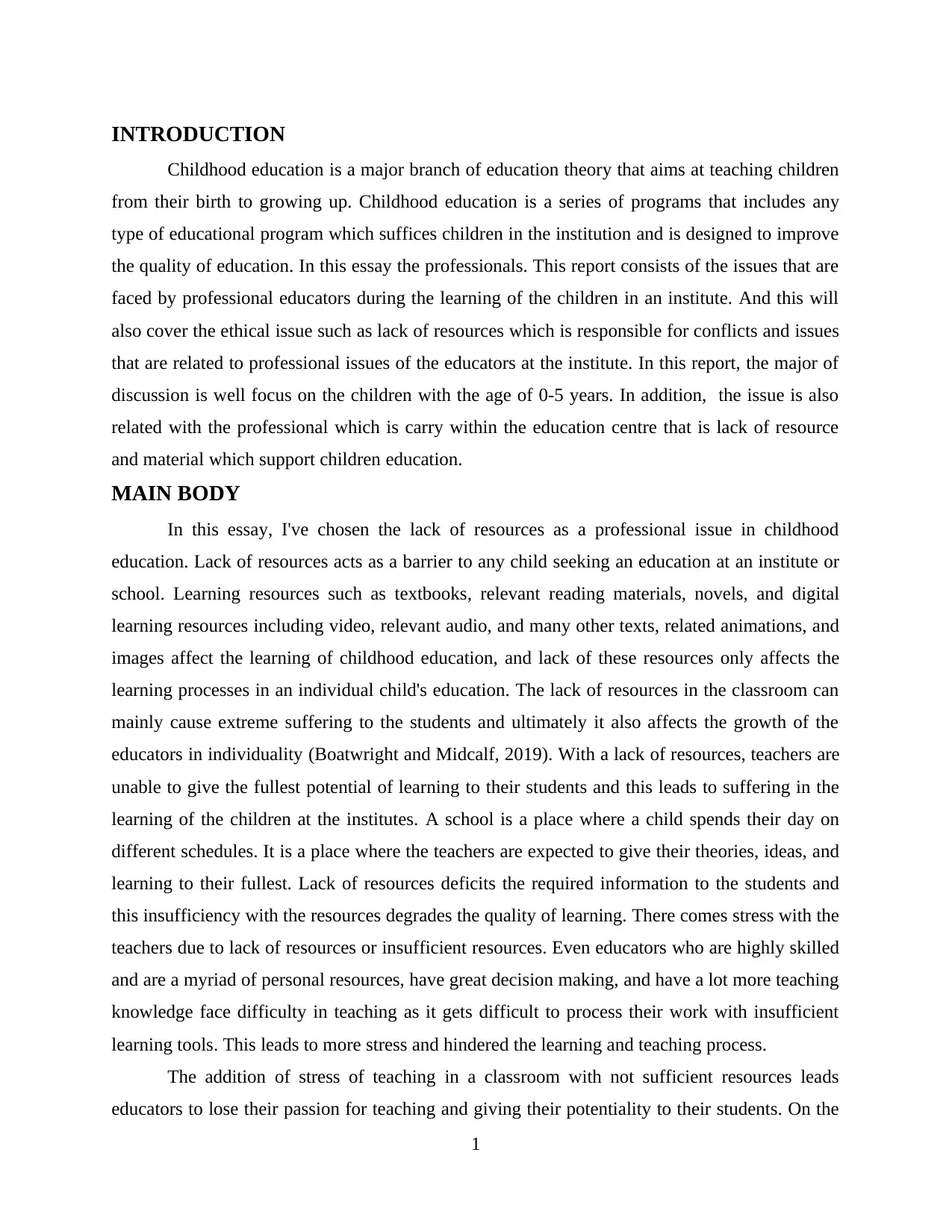
INTRODUCTION
Childhood education is a major branch of education theory that aims at teaching children
from their birth to growing up. Childhood education is a series of programs that includes any
type of educational program which suffices children in the institution and is designed to improve
the quality of education. In this essay the professionals. This report consists of the issues that are
faced by professional educators during the learning of the children in an institute. And this will
also cover the ethical issue such as lack of resources which is responsible for conflicts and issues
that are related to professional issues of the educators at the institute. In this report, the major of
discussion is well focus on the children with the age of 0-5 years. In addition, the issue is also
related with the professional which is carry within the education centre that is lack of resource
and material which support children education.
MAIN BODY
In this essay, I've chosen the lack of resources as a professional issue in childhood
education. Lack of resources acts as a barrier to any child seeking an education at an institute or
school. Learning resources such as textbooks, relevant reading materials, novels, and digital
learning resources including video, relevant audio, and many other texts, related animations, and
images affect the learning of childhood education, and lack of these resources only affects the
learning processes in an individual child's education. The lack of resources in the classroom can
mainly cause extreme suffering to the students and ultimately it also affects the growth of the
educators in individuality (Boatwright and Midcalf, 2019). With a lack of resources, teachers are
unable to give the fullest potential of learning to their students and this leads to suffering in the
learning of the children at the institutes. A school is a place where a child spends their day on
different schedules. It is a place where the teachers are expected to give their theories, ideas, and
learning to their fullest. Lack of resources deficits the required information to the students and
this insufficiency with the resources degrades the quality of learning. There comes stress with the
teachers due to lack of resources or insufficient resources. Even educators who are highly skilled
and are a myriad of personal resources, have great decision making, and have a lot more teaching
knowledge face difficulty in teaching as it gets difficult to process their work with insufficient
learning tools. This leads to more stress and hindered the learning and teaching process.
The addition of stress of teaching in a classroom with not sufficient resources leads
educators to lose their passion for teaching and giving their potentiality to their students. On the
1
Childhood education is a major branch of education theory that aims at teaching children
from their birth to growing up. Childhood education is a series of programs that includes any
type of educational program which suffices children in the institution and is designed to improve
the quality of education. In this essay the professionals. This report consists of the issues that are
faced by professional educators during the learning of the children in an institute. And this will
also cover the ethical issue such as lack of resources which is responsible for conflicts and issues
that are related to professional issues of the educators at the institute. In this report, the major of
discussion is well focus on the children with the age of 0-5 years. In addition, the issue is also
related with the professional which is carry within the education centre that is lack of resource
and material which support children education.
MAIN BODY
In this essay, I've chosen the lack of resources as a professional issue in childhood
education. Lack of resources acts as a barrier to any child seeking an education at an institute or
school. Learning resources such as textbooks, relevant reading materials, novels, and digital
learning resources including video, relevant audio, and many other texts, related animations, and
images affect the learning of childhood education, and lack of these resources only affects the
learning processes in an individual child's education. The lack of resources in the classroom can
mainly cause extreme suffering to the students and ultimately it also affects the growth of the
educators in individuality (Boatwright and Midcalf, 2019). With a lack of resources, teachers are
unable to give the fullest potential of learning to their students and this leads to suffering in the
learning of the children at the institutes. A school is a place where a child spends their day on
different schedules. It is a place where the teachers are expected to give their theories, ideas, and
learning to their fullest. Lack of resources deficits the required information to the students and
this insufficiency with the resources degrades the quality of learning. There comes stress with the
teachers due to lack of resources or insufficient resources. Even educators who are highly skilled
and are a myriad of personal resources, have great decision making, and have a lot more teaching
knowledge face difficulty in teaching as it gets difficult to process their work with insufficient
learning tools. This leads to more stress and hindered the learning and teaching process.
The addition of stress of teaching in a classroom with not sufficient resources leads
educators to lose their passion for teaching and giving their potentiality to their students. On the
1
⊘ This is a preview!⊘
Do you want full access?
Subscribe today to unlock all pages.

Trusted by 1+ million students worldwide
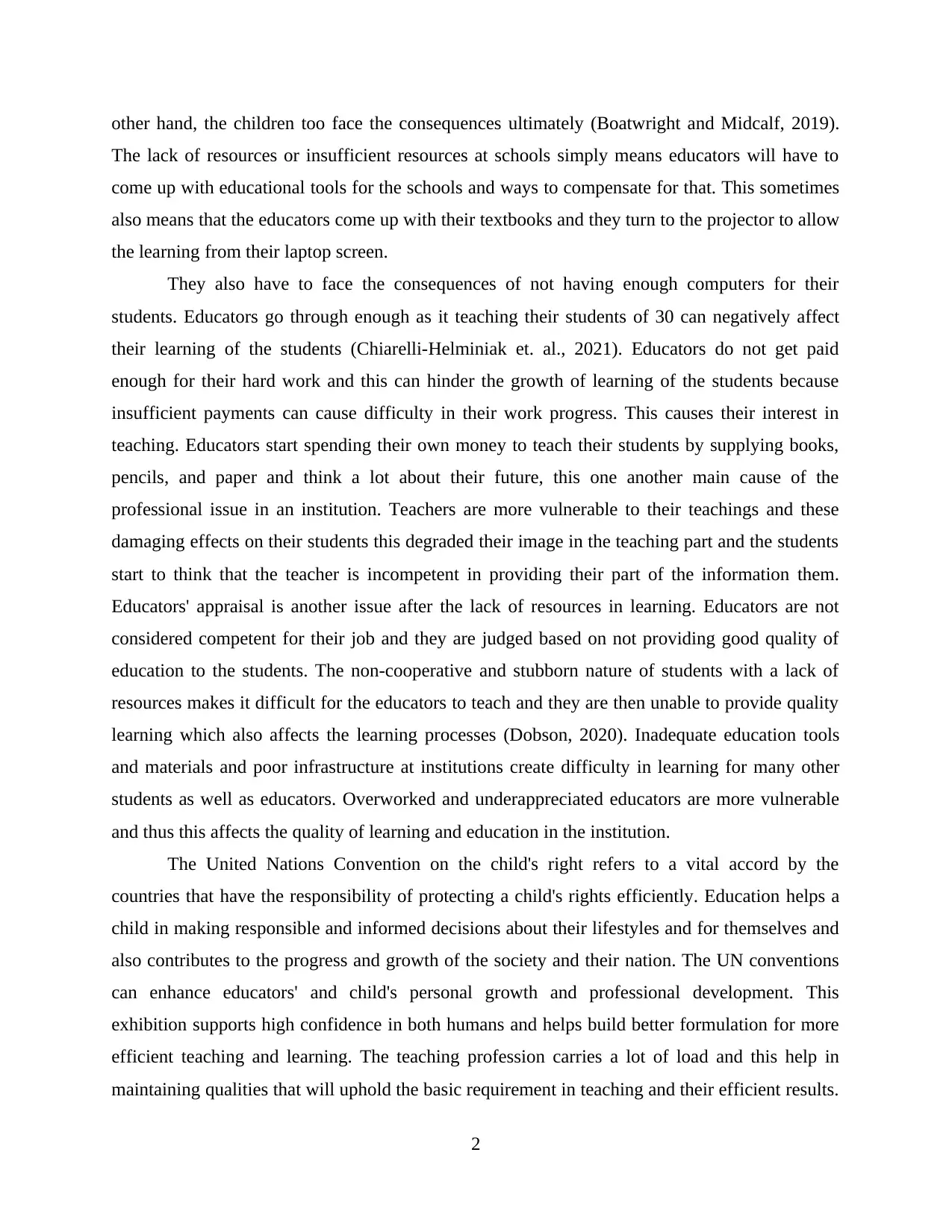
other hand, the children too face the consequences ultimately (Boatwright and Midcalf, 2019).
The lack of resources or insufficient resources at schools simply means educators will have to
come up with educational tools for the schools and ways to compensate for that. This sometimes
also means that the educators come up with their textbooks and they turn to the projector to allow
the learning from their laptop screen.
They also have to face the consequences of not having enough computers for their
students. Educators go through enough as it teaching their students of 30 can negatively affect
their learning of the students (Chiarelli-Helminiak et. al., 2021). Educators do not get paid
enough for their hard work and this can hinder the growth of learning of the students because
insufficient payments can cause difficulty in their work progress. This causes their interest in
teaching. Educators start spending their own money to teach their students by supplying books,
pencils, and paper and think a lot about their future, this one another main cause of the
professional issue in an institution. Teachers are more vulnerable to their teachings and these
damaging effects on their students this degraded their image in the teaching part and the students
start to think that the teacher is incompetent in providing their part of the information them.
Educators' appraisal is another issue after the lack of resources in learning. Educators are not
considered competent for their job and they are judged based on not providing good quality of
education to the students. The non-cooperative and stubborn nature of students with a lack of
resources makes it difficult for the educators to teach and they are then unable to provide quality
learning which also affects the learning processes (Dobson, 2020). Inadequate education tools
and materials and poor infrastructure at institutions create difficulty in learning for many other
students as well as educators. Overworked and underappreciated educators are more vulnerable
and thus this affects the quality of learning and education in the institution.
The United Nations Convention on the child's right refers to a vital accord by the
countries that have the responsibility of protecting a child's rights efficiently. Education helps a
child in making responsible and informed decisions about their lifestyles and for themselves and
also contributes to the progress and growth of the society and their nation. The UN conventions
can enhance educators' and child's personal growth and professional development. This
exhibition supports high confidence in both humans and helps build better formulation for more
efficient teaching and learning. The teaching profession carries a lot of load and this help in
maintaining qualities that will uphold the basic requirement in teaching and their efficient results.
2
The lack of resources or insufficient resources at schools simply means educators will have to
come up with educational tools for the schools and ways to compensate for that. This sometimes
also means that the educators come up with their textbooks and they turn to the projector to allow
the learning from their laptop screen.
They also have to face the consequences of not having enough computers for their
students. Educators go through enough as it teaching their students of 30 can negatively affect
their learning of the students (Chiarelli-Helminiak et. al., 2021). Educators do not get paid
enough for their hard work and this can hinder the growth of learning of the students because
insufficient payments can cause difficulty in their work progress. This causes their interest in
teaching. Educators start spending their own money to teach their students by supplying books,
pencils, and paper and think a lot about their future, this one another main cause of the
professional issue in an institution. Teachers are more vulnerable to their teachings and these
damaging effects on their students this degraded their image in the teaching part and the students
start to think that the teacher is incompetent in providing their part of the information them.
Educators' appraisal is another issue after the lack of resources in learning. Educators are not
considered competent for their job and they are judged based on not providing good quality of
education to the students. The non-cooperative and stubborn nature of students with a lack of
resources makes it difficult for the educators to teach and they are then unable to provide quality
learning which also affects the learning processes (Dobson, 2020). Inadequate education tools
and materials and poor infrastructure at institutions create difficulty in learning for many other
students as well as educators. Overworked and underappreciated educators are more vulnerable
and thus this affects the quality of learning and education in the institution.
The United Nations Convention on the child's right refers to a vital accord by the
countries that have the responsibility of protecting a child's rights efficiently. Education helps a
child in making responsible and informed decisions about their lifestyles and for themselves and
also contributes to the progress and growth of the society and their nation. The UN conventions
can enhance educators' and child's personal growth and professional development. This
exhibition supports high confidence in both humans and helps build better formulation for more
efficient teaching and learning. The teaching profession carries a lot of load and this help in
maintaining qualities that will uphold the basic requirement in teaching and their efficient results.
2
Paraphrase This Document
Need a fresh take? Get an instant paraphrase of this document with our AI Paraphraser
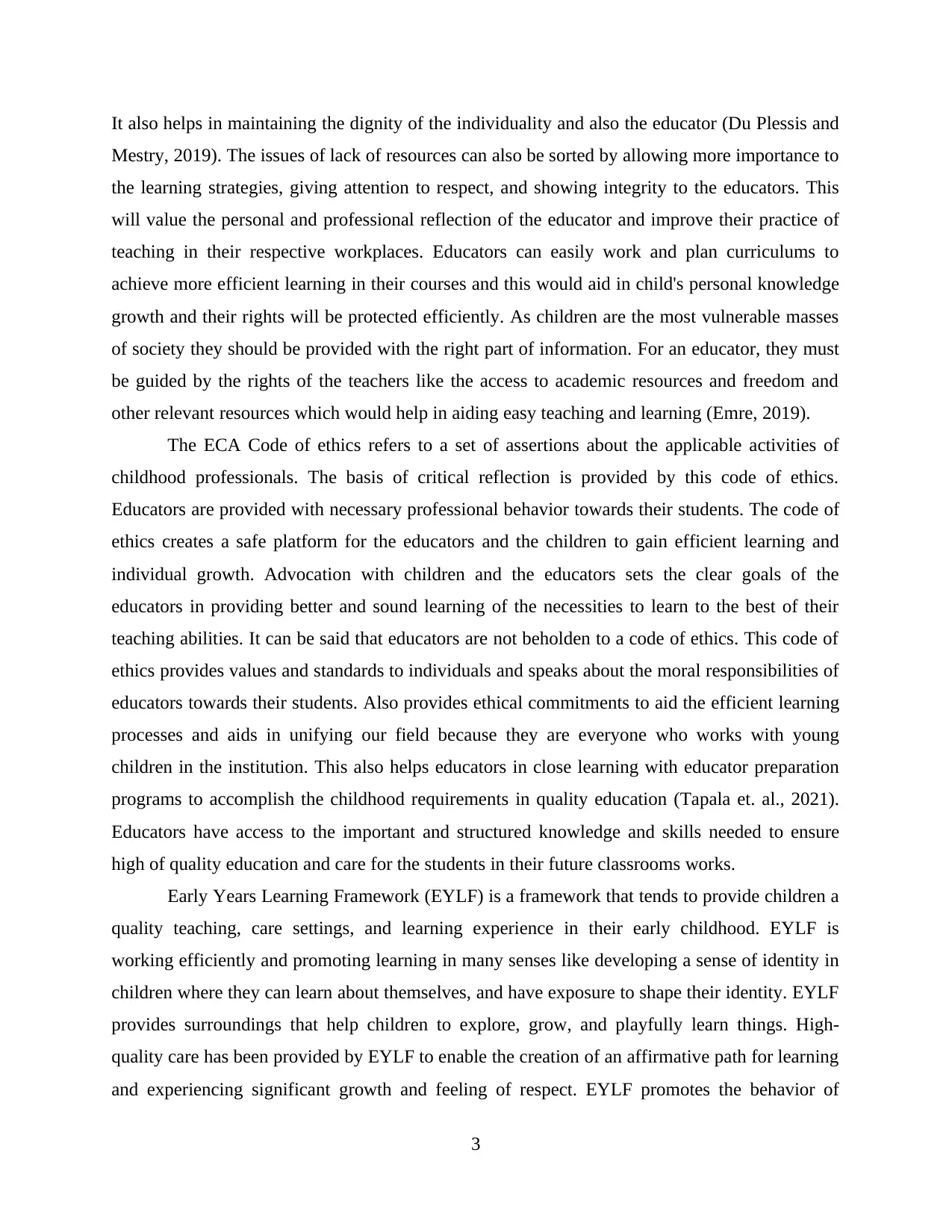
It also helps in maintaining the dignity of the individuality and also the educator (Du Plessis and
Mestry, 2019). The issues of lack of resources can also be sorted by allowing more importance to
the learning strategies, giving attention to respect, and showing integrity to the educators. This
will value the personal and professional reflection of the educator and improve their practice of
teaching in their respective workplaces. Educators can easily work and plan curriculums to
achieve more efficient learning in their courses and this would aid in child's personal knowledge
growth and their rights will be protected efficiently. As children are the most vulnerable masses
of society they should be provided with the right part of information. For an educator, they must
be guided by the rights of the teachers like the access to academic resources and freedom and
other relevant resources which would help in aiding easy teaching and learning (Emre, 2019).
The ECA Code of ethics refers to a set of assertions about the applicable activities of
childhood professionals. The basis of critical reflection is provided by this code of ethics.
Educators are provided with necessary professional behavior towards their students. The code of
ethics creates a safe platform for the educators and the children to gain efficient learning and
individual growth. Advocation with children and the educators sets the clear goals of the
educators in providing better and sound learning of the necessities to learn to the best of their
teaching abilities. It can be said that educators are not beholden to a code of ethics. This code of
ethics provides values and standards to individuals and speaks about the moral responsibilities of
educators towards their students. Also provides ethical commitments to aid the efficient learning
processes and aids in unifying our field because they are everyone who works with young
children in the institution. This also helps educators in close learning with educator preparation
programs to accomplish the childhood requirements in quality education (Tapala et. al., 2021).
Educators have access to the important and structured knowledge and skills needed to ensure
high of quality education and care for the students in their future classrooms works.
Early Years Learning Framework (EYLF) is a framework that tends to provide children a
quality teaching, care settings, and learning experience in their early childhood. EYLF is
working efficiently and promoting learning in many senses like developing a sense of identity in
children where they can learn about themselves, and have exposure to shape their identity. EYLF
provides surroundings that help children to explore, grow, and playfully learn things. High-
quality care has been provided by EYLF to enable the creation of an affirmative path for learning
and experiencing significant growth and feeling of respect. EYLF promotes the behavior of
3
Mestry, 2019). The issues of lack of resources can also be sorted by allowing more importance to
the learning strategies, giving attention to respect, and showing integrity to the educators. This
will value the personal and professional reflection of the educator and improve their practice of
teaching in their respective workplaces. Educators can easily work and plan curriculums to
achieve more efficient learning in their courses and this would aid in child's personal knowledge
growth and their rights will be protected efficiently. As children are the most vulnerable masses
of society they should be provided with the right part of information. For an educator, they must
be guided by the rights of the teachers like the access to academic resources and freedom and
other relevant resources which would help in aiding easy teaching and learning (Emre, 2019).
The ECA Code of ethics refers to a set of assertions about the applicable activities of
childhood professionals. The basis of critical reflection is provided by this code of ethics.
Educators are provided with necessary professional behavior towards their students. The code of
ethics creates a safe platform for the educators and the children to gain efficient learning and
individual growth. Advocation with children and the educators sets the clear goals of the
educators in providing better and sound learning of the necessities to learn to the best of their
teaching abilities. It can be said that educators are not beholden to a code of ethics. This code of
ethics provides values and standards to individuals and speaks about the moral responsibilities of
educators towards their students. Also provides ethical commitments to aid the efficient learning
processes and aids in unifying our field because they are everyone who works with young
children in the institution. This also helps educators in close learning with educator preparation
programs to accomplish the childhood requirements in quality education (Tapala et. al., 2021).
Educators have access to the important and structured knowledge and skills needed to ensure
high of quality education and care for the students in their future classrooms works.
Early Years Learning Framework (EYLF) is a framework that tends to provide children a
quality teaching, care settings, and learning experience in their early childhood. EYLF is
working efficiently and promoting learning in many senses like developing a sense of identity in
children where they can learn about themselves, and have exposure to shape their identity. EYLF
provides surroundings that help children to explore, grow, and playfully learn things. High-
quality care has been provided by EYLF to enable the creation of an affirmative path for learning
and experiencing significant growth and feeling of respect. EYLF promotes the behavior of
3
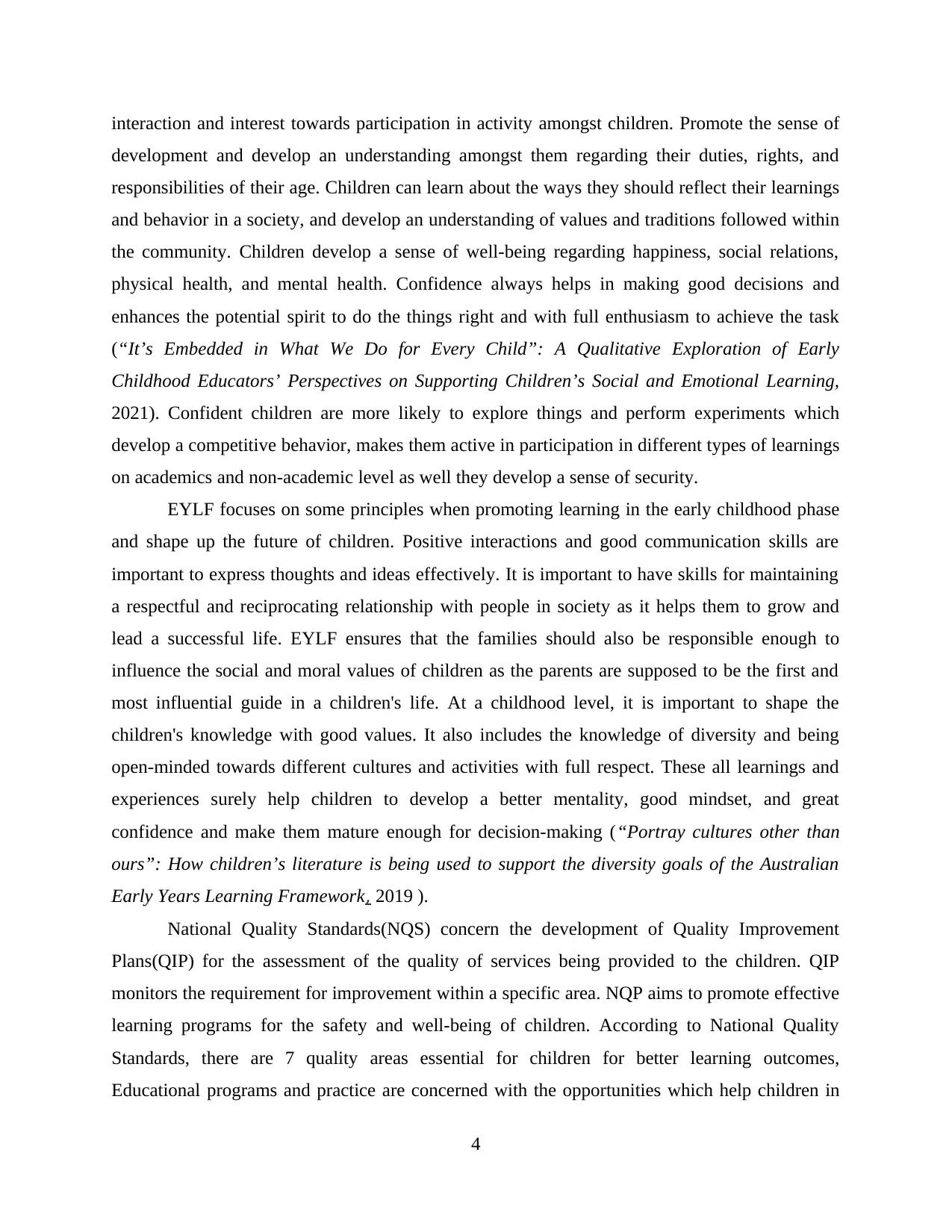
interaction and interest towards participation in activity amongst children. Promote the sense of
development and develop an understanding amongst them regarding their duties, rights, and
responsibilities of their age. Children can learn about the ways they should reflect their learnings
and behavior in a society, and develop an understanding of values and traditions followed within
the community. Children develop a sense of well-being regarding happiness, social relations,
physical health, and mental health. Confidence always helps in making good decisions and
enhances the potential spirit to do the things right and with full enthusiasm to achieve the task
(“It’s Embedded in What We Do for Every Child”: A Qualitative Exploration of Early
Childhood Educators’ Perspectives on Supporting Children’s Social and Emotional Learning,
2021). Confident children are more likely to explore things and perform experiments which
develop a competitive behavior, makes them active in participation in different types of learnings
on academics and non-academic level as well they develop a sense of security.
EYLF focuses on some principles when promoting learning in the early childhood phase
and shape up the future of children. Positive interactions and good communication skills are
important to express thoughts and ideas effectively. It is important to have skills for maintaining
a respectful and reciprocating relationship with people in society as it helps them to grow and
lead a successful life. EYLF ensures that the families should also be responsible enough to
influence the social and moral values of children as the parents are supposed to be the first and
most influential guide in a children's life. At a childhood level, it is important to shape the
children's knowledge with good values. It also includes the knowledge of diversity and being
open-minded towards different cultures and activities with full respect. These all learnings and
experiences surely help children to develop a better mentality, good mindset, and great
confidence and make them mature enough for decision-making (“Portray cultures other than
ours”: How children’s literature is being used to support the diversity goals of the Australian
Early Years Learning Framework, 2019 ).
National Quality Standards(NQS) concern the development of Quality Improvement
Plans(QIP) for the assessment of the quality of services being provided to the children. QIP
monitors the requirement for improvement within a specific area. NQP aims to promote effective
learning programs for the safety and well-being of children. According to National Quality
Standards, there are 7 quality areas essential for children for better learning outcomes,
Educational programs and practice are concerned with the opportunities which help children in
4
development and develop an understanding amongst them regarding their duties, rights, and
responsibilities of their age. Children can learn about the ways they should reflect their learnings
and behavior in a society, and develop an understanding of values and traditions followed within
the community. Children develop a sense of well-being regarding happiness, social relations,
physical health, and mental health. Confidence always helps in making good decisions and
enhances the potential spirit to do the things right and with full enthusiasm to achieve the task
(“It’s Embedded in What We Do for Every Child”: A Qualitative Exploration of Early
Childhood Educators’ Perspectives on Supporting Children’s Social and Emotional Learning,
2021). Confident children are more likely to explore things and perform experiments which
develop a competitive behavior, makes them active in participation in different types of learnings
on academics and non-academic level as well they develop a sense of security.
EYLF focuses on some principles when promoting learning in the early childhood phase
and shape up the future of children. Positive interactions and good communication skills are
important to express thoughts and ideas effectively. It is important to have skills for maintaining
a respectful and reciprocating relationship with people in society as it helps them to grow and
lead a successful life. EYLF ensures that the families should also be responsible enough to
influence the social and moral values of children as the parents are supposed to be the first and
most influential guide in a children's life. At a childhood level, it is important to shape the
children's knowledge with good values. It also includes the knowledge of diversity and being
open-minded towards different cultures and activities with full respect. These all learnings and
experiences surely help children to develop a better mentality, good mindset, and great
confidence and make them mature enough for decision-making (“Portray cultures other than
ours”: How children’s literature is being used to support the diversity goals of the Australian
Early Years Learning Framework, 2019 ).
National Quality Standards(NQS) concern the development of Quality Improvement
Plans(QIP) for the assessment of the quality of services being provided to the children. QIP
monitors the requirement for improvement within a specific area. NQP aims to promote effective
learning programs for the safety and well-being of children. According to National Quality
Standards, there are 7 quality areas essential for children for better learning outcomes,
Educational programs and practice are concerned with the opportunities which help children in
4
⊘ This is a preview!⊘
Do you want full access?
Subscribe today to unlock all pages.

Trusted by 1+ million students worldwide
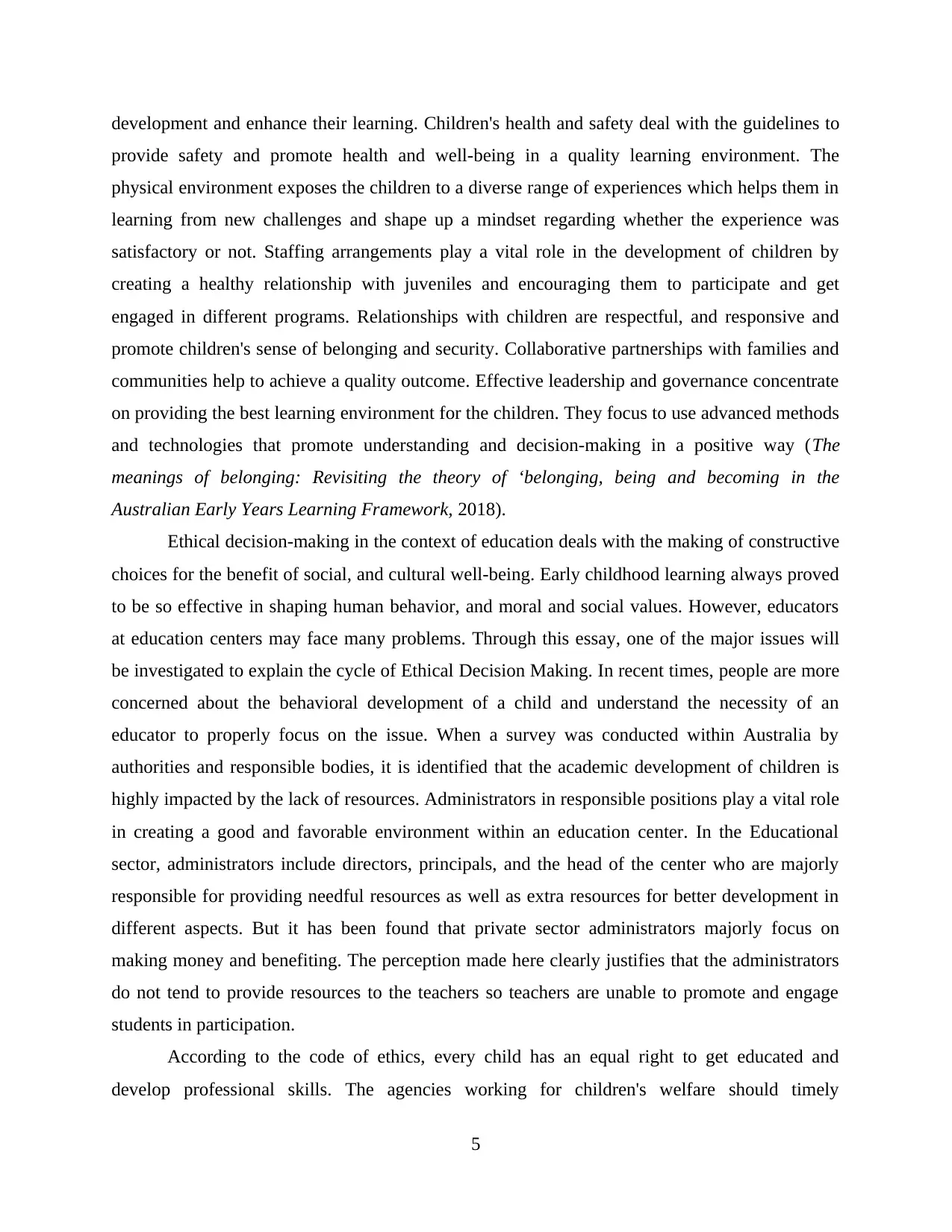
development and enhance their learning. Children's health and safety deal with the guidelines to
provide safety and promote health and well-being in a quality learning environment. The
physical environment exposes the children to a diverse range of experiences which helps them in
learning from new challenges and shape up a mindset regarding whether the experience was
satisfactory or not. Staffing arrangements play a vital role in the development of children by
creating a healthy relationship with juveniles and encouraging them to participate and get
engaged in different programs. Relationships with children are respectful, and responsive and
promote children's sense of belonging and security. Collaborative partnerships with families and
communities help to achieve a quality outcome. Effective leadership and governance concentrate
on providing the best learning environment for the children. They focus to use advanced methods
and technologies that promote understanding and decision-making in a positive way (The
meanings of belonging: Revisiting the theory of ‘belonging, being and becoming in the
Australian Early Years Learning Framework, 2018).
Ethical decision-making in the context of education deals with the making of constructive
choices for the benefit of social, and cultural well-being. Early childhood learning always proved
to be so effective in shaping human behavior, and moral and social values. However, educators
at education centers may face many problems. Through this essay, one of the major issues will
be investigated to explain the cycle of Ethical Decision Making. In recent times, people are more
concerned about the behavioral development of a child and understand the necessity of an
educator to properly focus on the issue. When a survey was conducted within Australia by
authorities and responsible bodies, it is identified that the academic development of children is
highly impacted by the lack of resources. Administrators in responsible positions play a vital role
in creating a good and favorable environment within an education center. In the Educational
sector, administrators include directors, principals, and the head of the center who are majorly
responsible for providing needful resources as well as extra resources for better development in
different aspects. But it has been found that private sector administrators majorly focus on
making money and benefiting. The perception made here clearly justifies that the administrators
do not tend to provide resources to the teachers so teachers are unable to promote and engage
students in participation.
According to the code of ethics, every child has an equal right to get educated and
develop professional skills. The agencies working for children's welfare should timely
5
provide safety and promote health and well-being in a quality learning environment. The
physical environment exposes the children to a diverse range of experiences which helps them in
learning from new challenges and shape up a mindset regarding whether the experience was
satisfactory or not. Staffing arrangements play a vital role in the development of children by
creating a healthy relationship with juveniles and encouraging them to participate and get
engaged in different programs. Relationships with children are respectful, and responsive and
promote children's sense of belonging and security. Collaborative partnerships with families and
communities help to achieve a quality outcome. Effective leadership and governance concentrate
on providing the best learning environment for the children. They focus to use advanced methods
and technologies that promote understanding and decision-making in a positive way (The
meanings of belonging: Revisiting the theory of ‘belonging, being and becoming in the
Australian Early Years Learning Framework, 2018).
Ethical decision-making in the context of education deals with the making of constructive
choices for the benefit of social, and cultural well-being. Early childhood learning always proved
to be so effective in shaping human behavior, and moral and social values. However, educators
at education centers may face many problems. Through this essay, one of the major issues will
be investigated to explain the cycle of Ethical Decision Making. In recent times, people are more
concerned about the behavioral development of a child and understand the necessity of an
educator to properly focus on the issue. When a survey was conducted within Australia by
authorities and responsible bodies, it is identified that the academic development of children is
highly impacted by the lack of resources. Administrators in responsible positions play a vital role
in creating a good and favorable environment within an education center. In the Educational
sector, administrators include directors, principals, and the head of the center who are majorly
responsible for providing needful resources as well as extra resources for better development in
different aspects. But it has been found that private sector administrators majorly focus on
making money and benefiting. The perception made here clearly justifies that the administrators
do not tend to provide resources to the teachers so teachers are unable to promote and engage
students in participation.
According to the code of ethics, every child has an equal right to get educated and
develop professional skills. The agencies working for children's welfare should timely
5
Paraphrase This Document
Need a fresh take? Get an instant paraphrase of this document with our AI Paraphraser
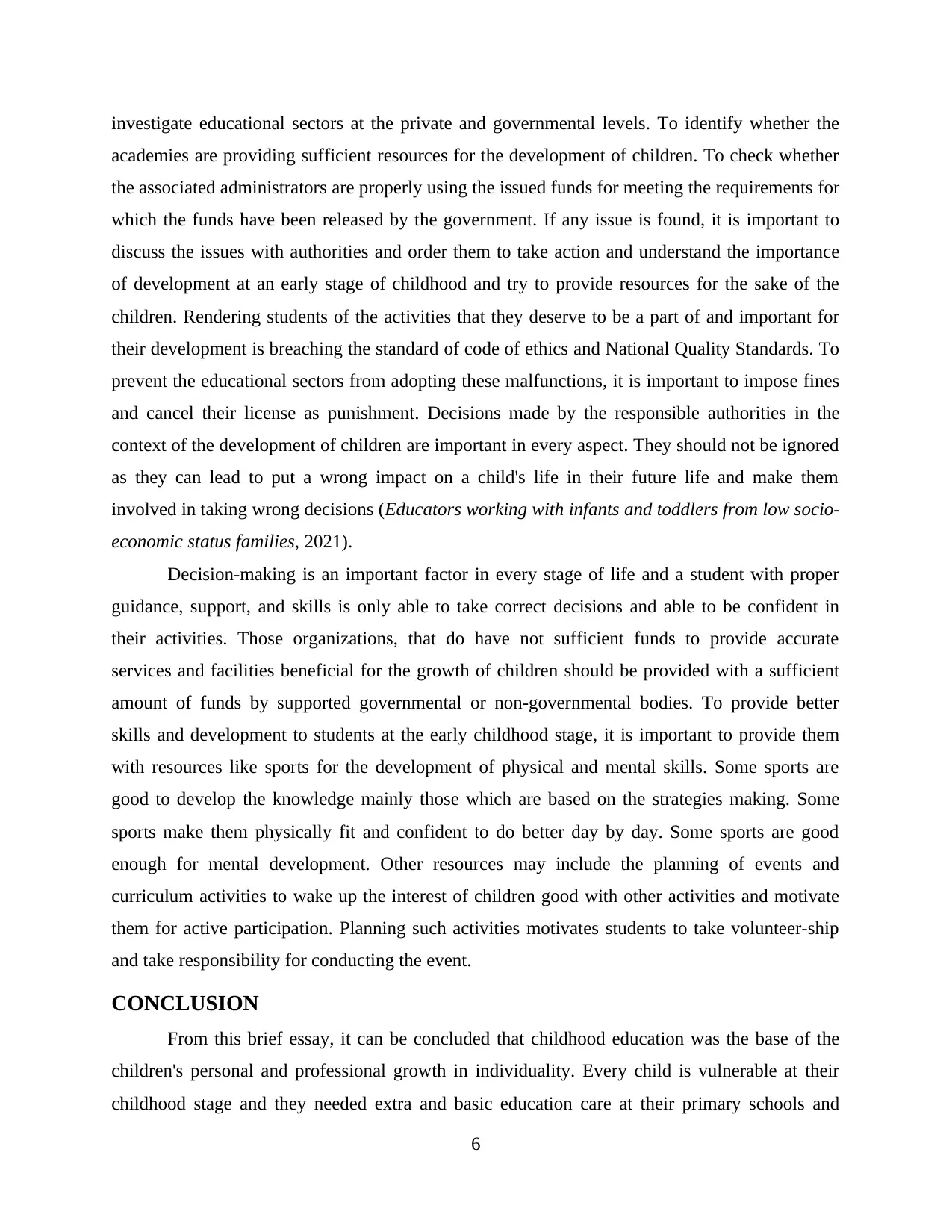
investigate educational sectors at the private and governmental levels. To identify whether the
academies are providing sufficient resources for the development of children. To check whether
the associated administrators are properly using the issued funds for meeting the requirements for
which the funds have been released by the government. If any issue is found, it is important to
discuss the issues with authorities and order them to take action and understand the importance
of development at an early stage of childhood and try to provide resources for the sake of the
children. Rendering students of the activities that they deserve to be a part of and important for
their development is breaching the standard of code of ethics and National Quality Standards. To
prevent the educational sectors from adopting these malfunctions, it is important to impose fines
and cancel their license as punishment. Decisions made by the responsible authorities in the
context of the development of children are important in every aspect. They should not be ignored
as they can lead to put a wrong impact on a child's life in their future life and make them
involved in taking wrong decisions (Educators working with infants and toddlers from low socio-
economic status families, 2021).
Decision-making is an important factor in every stage of life and a student with proper
guidance, support, and skills is only able to take correct decisions and able to be confident in
their activities. Those organizations, that do have not sufficient funds to provide accurate
services and facilities beneficial for the growth of children should be provided with a sufficient
amount of funds by supported governmental or non-governmental bodies. To provide better
skills and development to students at the early childhood stage, it is important to provide them
with resources like sports for the development of physical and mental skills. Some sports are
good to develop the knowledge mainly those which are based on the strategies making. Some
sports make them physically fit and confident to do better day by day. Some sports are good
enough for mental development. Other resources may include the planning of events and
curriculum activities to wake up the interest of children good with other activities and motivate
them for active participation. Planning such activities motivates students to take volunteer-ship
and take responsibility for conducting the event.
CONCLUSION
From this brief essay, it can be concluded that childhood education was the base of the
children's personal and professional growth in individuality. Every child is vulnerable at their
childhood stage and they needed extra and basic education care at their primary schools and
6
academies are providing sufficient resources for the development of children. To check whether
the associated administrators are properly using the issued funds for meeting the requirements for
which the funds have been released by the government. If any issue is found, it is important to
discuss the issues with authorities and order them to take action and understand the importance
of development at an early stage of childhood and try to provide resources for the sake of the
children. Rendering students of the activities that they deserve to be a part of and important for
their development is breaching the standard of code of ethics and National Quality Standards. To
prevent the educational sectors from adopting these malfunctions, it is important to impose fines
and cancel their license as punishment. Decisions made by the responsible authorities in the
context of the development of children are important in every aspect. They should not be ignored
as they can lead to put a wrong impact on a child's life in their future life and make them
involved in taking wrong decisions (Educators working with infants and toddlers from low socio-
economic status families, 2021).
Decision-making is an important factor in every stage of life and a student with proper
guidance, support, and skills is only able to take correct decisions and able to be confident in
their activities. Those organizations, that do have not sufficient funds to provide accurate
services and facilities beneficial for the growth of children should be provided with a sufficient
amount of funds by supported governmental or non-governmental bodies. To provide better
skills and development to students at the early childhood stage, it is important to provide them
with resources like sports for the development of physical and mental skills. Some sports are
good to develop the knowledge mainly those which are based on the strategies making. Some
sports make them physically fit and confident to do better day by day. Some sports are good
enough for mental development. Other resources may include the planning of events and
curriculum activities to wake up the interest of children good with other activities and motivate
them for active participation. Planning such activities motivates students to take volunteer-ship
and take responsibility for conducting the event.
CONCLUSION
From this brief essay, it can be concluded that childhood education was the base of the
children's personal and professional growth in individuality. Every child is vulnerable at their
childhood stage and they needed extra and basic education care at their primary schools and
6
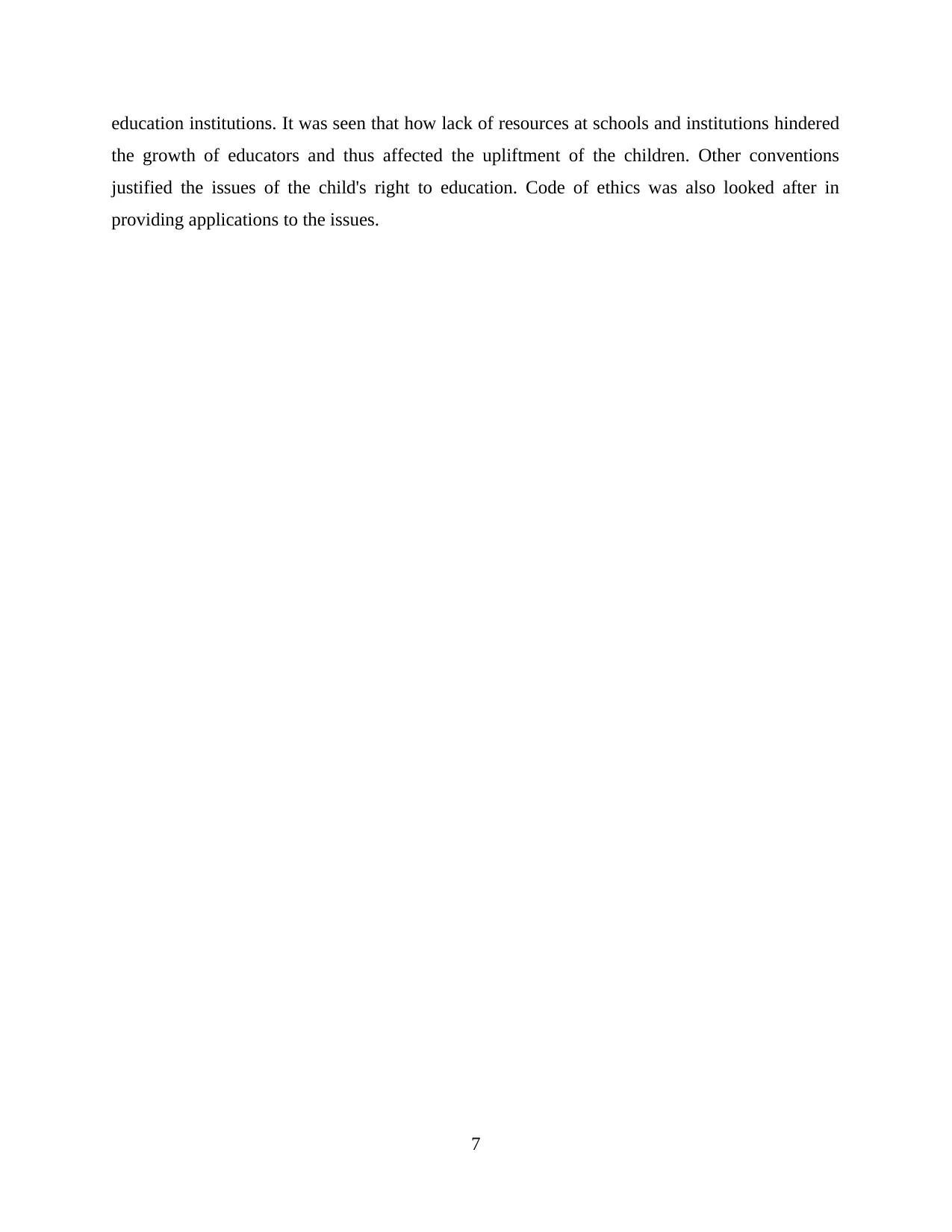
education institutions. It was seen that how lack of resources at schools and institutions hindered
the growth of educators and thus affected the upliftment of the children. Other conventions
justified the issues of the child's right to education. Code of ethics was also looked after in
providing applications to the issues.
7
the growth of educators and thus affected the upliftment of the children. Other conventions
justified the issues of the child's right to education. Code of ethics was also looked after in
providing applications to the issues.
7
⊘ This is a preview!⊘
Do you want full access?
Subscribe today to unlock all pages.

Trusted by 1+ million students worldwide
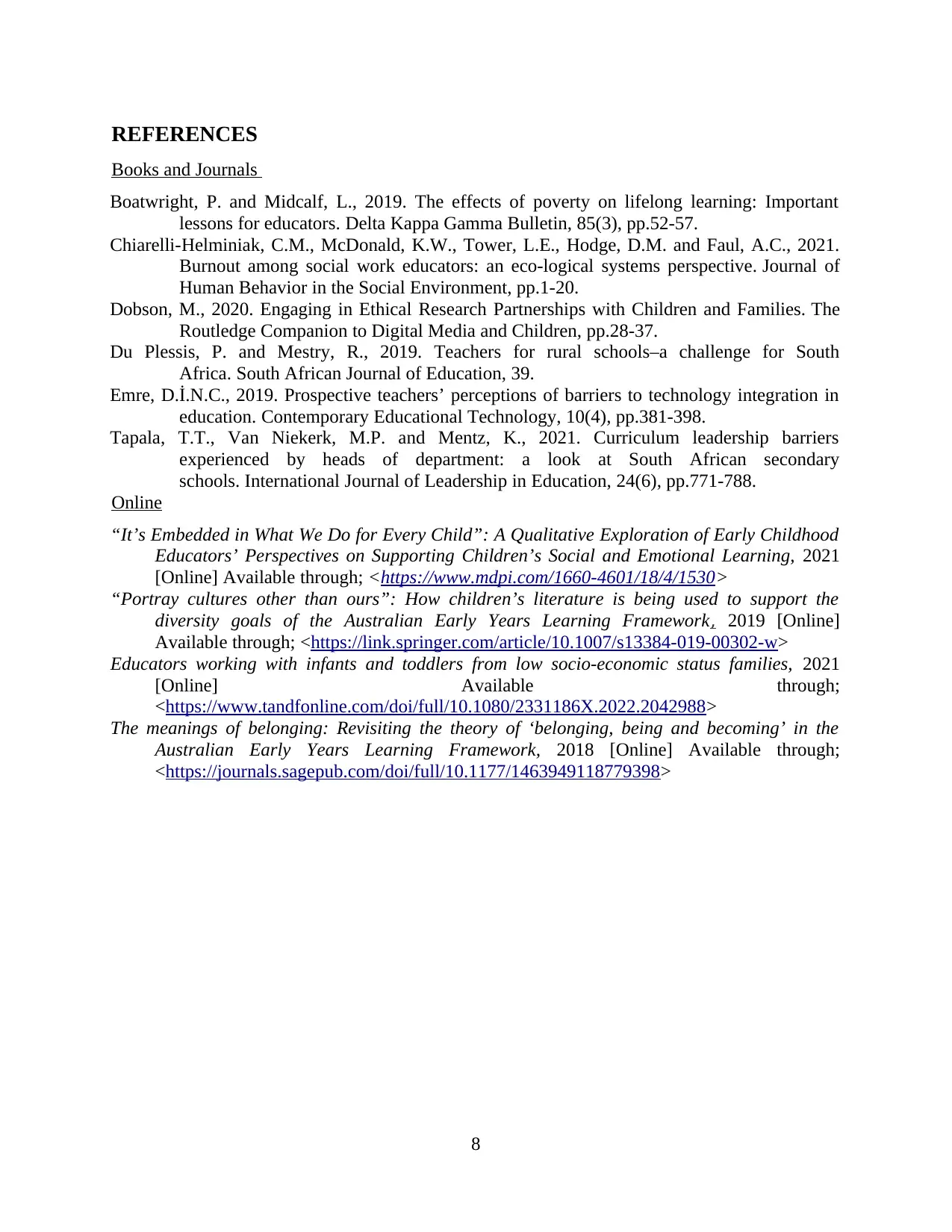
REFERENCES
Books and Journals
Boatwright, P. and Midcalf, L., 2019. The effects of poverty on lifelong learning: Important
lessons for educators. Delta Kappa Gamma Bulletin, 85(3), pp.52-57.
Chiarelli-Helminiak, C.M., McDonald, K.W., Tower, L.E., Hodge, D.M. and Faul, A.C., 2021.
Burnout among social work educators: an eco-logical systems perspective. Journal of
Human Behavior in the Social Environment, pp.1-20.
Dobson, M., 2020. Engaging in Ethical Research Partnerships with Children and Families. The
Routledge Companion to Digital Media and Children, pp.28-37.
Du Plessis, P. and Mestry, R., 2019. Teachers for rural schools–a challenge for South
Africa. South African Journal of Education, 39.
Emre, D.İ.N.C., 2019. Prospective teachers’ perceptions of barriers to technology integration in
education. Contemporary Educational Technology, 10(4), pp.381-398.
Tapala, T.T., Van Niekerk, M.P. and Mentz, K., 2021. Curriculum leadership barriers
experienced by heads of department: a look at South African secondary
schools. International Journal of Leadership in Education, 24(6), pp.771-788.
Online
“It’s Embedded in What We Do for Every Child”: A Qualitative Exploration of Early Childhood
Educators’ Perspectives on Supporting Children’s Social and Emotional Learning, 2021
[Online] Available through; <https://www.mdpi.com/1660-4601/18/4/1530>
“Portray cultures other than ours”: How children’s literature is being used to support the
diversity goals of the Australian Early Years Learning Framework, 2019 [Online]
Available through; <https://link.springer.com/article/10.1007/s13384-019-00302-w>
Educators working with infants and toddlers from low socio-economic status families, 2021
[Online] Available through;
<https://www.tandfonline.com/doi/full/10.1080/2331186X.2022.2042988>
The meanings of belonging: Revisiting the theory of ‘belonging, being and becoming’ in the
Australian Early Years Learning Framework, 2018 [Online] Available through;
<https://journals.sagepub.com/doi/full/10.1177/1463949118779398>
8
Books and Journals
Boatwright, P. and Midcalf, L., 2019. The effects of poverty on lifelong learning: Important
lessons for educators. Delta Kappa Gamma Bulletin, 85(3), pp.52-57.
Chiarelli-Helminiak, C.M., McDonald, K.W., Tower, L.E., Hodge, D.M. and Faul, A.C., 2021.
Burnout among social work educators: an eco-logical systems perspective. Journal of
Human Behavior in the Social Environment, pp.1-20.
Dobson, M., 2020. Engaging in Ethical Research Partnerships with Children and Families. The
Routledge Companion to Digital Media and Children, pp.28-37.
Du Plessis, P. and Mestry, R., 2019. Teachers for rural schools–a challenge for South
Africa. South African Journal of Education, 39.
Emre, D.İ.N.C., 2019. Prospective teachers’ perceptions of barriers to technology integration in
education. Contemporary Educational Technology, 10(4), pp.381-398.
Tapala, T.T., Van Niekerk, M.P. and Mentz, K., 2021. Curriculum leadership barriers
experienced by heads of department: a look at South African secondary
schools. International Journal of Leadership in Education, 24(6), pp.771-788.
Online
“It’s Embedded in What We Do for Every Child”: A Qualitative Exploration of Early Childhood
Educators’ Perspectives on Supporting Children’s Social and Emotional Learning, 2021
[Online] Available through; <https://www.mdpi.com/1660-4601/18/4/1530>
“Portray cultures other than ours”: How children’s literature is being used to support the
diversity goals of the Australian Early Years Learning Framework, 2019 [Online]
Available through; <https://link.springer.com/article/10.1007/s13384-019-00302-w>
Educators working with infants and toddlers from low socio-economic status families, 2021
[Online] Available through;
<https://www.tandfonline.com/doi/full/10.1080/2331186X.2022.2042988>
The meanings of belonging: Revisiting the theory of ‘belonging, being and becoming’ in the
Australian Early Years Learning Framework, 2018 [Online] Available through;
<https://journals.sagepub.com/doi/full/10.1177/1463949118779398>
8
Paraphrase This Document
Need a fresh take? Get an instant paraphrase of this document with our AI Paraphraser

9
1 out of 11
Related Documents
Your All-in-One AI-Powered Toolkit for Academic Success.
+13062052269
info@desklib.com
Available 24*7 on WhatsApp / Email
![[object Object]](/_next/static/media/star-bottom.7253800d.svg)
Unlock your academic potential
Copyright © 2020–2025 A2Z Services. All Rights Reserved. Developed and managed by ZUCOL.





